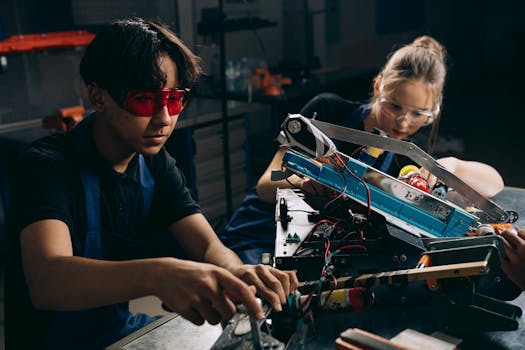Worried about AI stealing your job? A new study suggests the impact of artificial intelligence on the labor market will be more about transformation than outright replacement. Learn how AI is changing work and what skills you'll need to thrive.

AI: Transforming Work, Not Replacing Jobs (Yet)
Are robots coming for your job? The narrative around artificial intelligence often paints a picture of widespread job displacement, leaving many workers understandably anxious. However, a recent study offers a more nuanced perspective: AI is more likely to transform existing roles than to completely eliminate them, at least in the short to medium term. This means that while some tasks will be automated, new opportunities and skill requirements will emerge, demanding a proactive approach to adaptation and learning.
The Shifting Landscape of Work
The fear of automation isn't new. Throughout history, technological advancements have sparked concerns about job losses. However, these advancements have also created new industries and job categories. AI is no different. While it certainly poses challenges, it also presents significant opportunities for innovation and economic growth.
# Automation vs. Augmentation
It's crucial to differentiate between automation and augmentation. Automation refers to the complete replacement of human tasks with AI-powered systems. Augmentation, on the other hand, involves using AI to enhance human capabilities and productivity. The study suggests that augmentation will be the more prevalent trend in the near future.
- Example: Instead of replacing customer service representatives with chatbots entirely, AI can be used to analyze customer sentiment, provide agents with real-time information, and automate routine tasks, allowing them to focus on more complex and empathetic interactions.
# New Skills for a New Era
As AI takes over repetitive and mundane tasks, human workers will need to develop new skills to remain competitive. These skills include:
- Critical Thinking: The ability to analyze information, identify problems, and develop creative solutions will be highly valued.
- Problem-Solving: AI can identify issues, but humans are still needed to develop and implement effective solutions.
- Creativity and Innovation: AI can assist with creative tasks, but it's human ingenuity that drives true innovation.
- Emotional Intelligence: Skills like empathy, communication, and collaboration will be essential for managing teams and building relationships.
- Technical Literacy: A basic understanding of AI and related technologies will be increasingly important, even for non-technical roles.
Practical Tips for Adapting to the AI Revolution
So, how can you prepare for the changing landscape of work?
- Embrace Lifelong Learning: Continuously update your skills and knowledge through online courses, workshops, and industry events.
- Identify Transferable Skills: Recognize the skills you already possess that can be applied to new roles and industries.
- Seek Opportunities for Collaboration: Look for ways to work alongside AI systems and leverage their capabilities to enhance your own performance.
- Develop Your Soft Skills: Focus on improving your communication, collaboration, and problem-solving abilities.
- Stay Informed: Keep up-to-date on the latest developments in AI and how they are impacting your industry.
The Future of Work is Collaborative
The study emphasizes that the future of work is not about humans versus machines, but rather about humans and machines working together. By embracing AI as a tool to augment our capabilities, we can create a more productive, innovative, and fulfilling work environment. The key is to proactively adapt to the changing landscape, develop the necessary skills, and embrace a mindset of continuous learning.
In Conclusion: The rise of AI presents both challenges and opportunities. By focusing on developing uniquely human skills and embracing a collaborative approach, we can navigate the AI revolution and create a future where technology empowers us to achieve even greater things.
